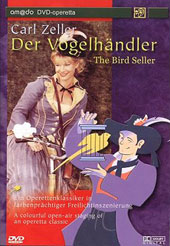
The Bird Seller
Die Vogelhändler
An operetta in 3 acts by Moritz West and Ludwig Held based on the comedy Ce qui deviennent les roses by Varin and Biéville; Music by Carl Zeller, adaptation by Bruce Walker, Fred Tysh and Hans May
Theater an der Wein, Vienna - 10 January 1891
Theatre Royal, Drury Lane - 17 June, 1895
Casino Theatre New York - 5 October, 1891 (as The Tyrolean)
Synopsis
Set in the colourful milieu of Bavaria, this is a story of two young lovers - Christel, the village postmistress, and Adam, a handsome bird seller from the Tyrol - who, at cross-purposes, become embroiled in romantic complications at the Court of the reigning Prince. The highly entertaining intrigues and misunderstandings - involving quite a number of distinctive characters - are eventually sorted out to the accompaniment of some of Zeller's brightest and most liltingly-tuneful music.
The Story:
Adam, a bird-seller from Tyrol, comes to the Rhenish Palatinate to see his bride, the "Christel von der Post". At the Court of the Electress Marie, the position of the director of her menagerie is vacant. Christel wants to ask the Elector to take Adam for the vacant position. But Adam does aot agree with her plan since he knows that the Elector is a great dangler after girls, and Adam is very jealous!
Baron Weps, who has been ordered by the Elector to arrange the hunting, is faced with an unpleasant surprise; all wild boars have already been shoot by the farmers. The farmers offer him hush money which Weps accepts very willingly. Weps is faced with a new, difficult situation when the Elector suddenly cancels the hunting. He is obliged to return the money or make compensation. So Count Stanislaus acts as Elector. Christel asks to be admitted to an audience of the false elector in the pavilion. She is watched by the farmers who immediately inform Adam. Because of his disappointment he pays attention to a pretty country-girl called Marie. She is none other than the Electress who came here to watch the escapades of her husband.
Marie likes the handsome. unaffected boy and gives him a rose. The Electress very soon learns the whole story of the quarrel between Adam and Christel. The man in the pavilion can never have been the Elector. She takes Christel with her to the Court to unmask the swindler. In the castle Count Stanislaus is unmasked as the false elector. Adam, who does not believe in Christel's protestations of innocence, demands that Stanislaus marries her, and he himself courts the Electress' favour. But she only wants to give him the vacant position of director of her menagerie.
In the meantime preparations are made for the marriage of Christel and Count Stanislaus. Adam and Christel are feeling quite uncomfortable with all what is going on. The Electress causes Stanislaus to speak with Adam about the rendezvous in the pavilion and he willingly confirms that nothing improper has happened. So he does not need to marry Christel but is free to marry the elderly, but wealthy, Baroness Adelaide. Adam and Christel end their quarrel.
Principals:
11 female (1 non-singing), 14 male (4 non-singing)
Princess Marie
Baroness Adelaide, Countess Mimi - ladies at Court
Baron Weps - Master of the Hunt
Count Stanislais - his nephew, a guards officer
Süffle, Würmchen - professors
Adam - a birdseller from the Tyrol
Christel - the post mistress
Schneck - the village mayor
Frau Nebel - the inn landlady
Jette - a waitress
Tyroleans, people of the Pfalz, country folk, society people
Instrumentation:
flute, oboe, 2 clarinets, bassoon, 2 horns, 2 trumpets, 2 trombones, percussion, harp, strings
Vocal Score and Libretto on hire only
